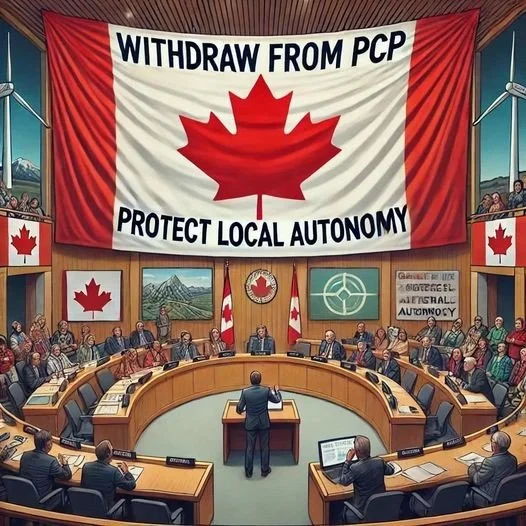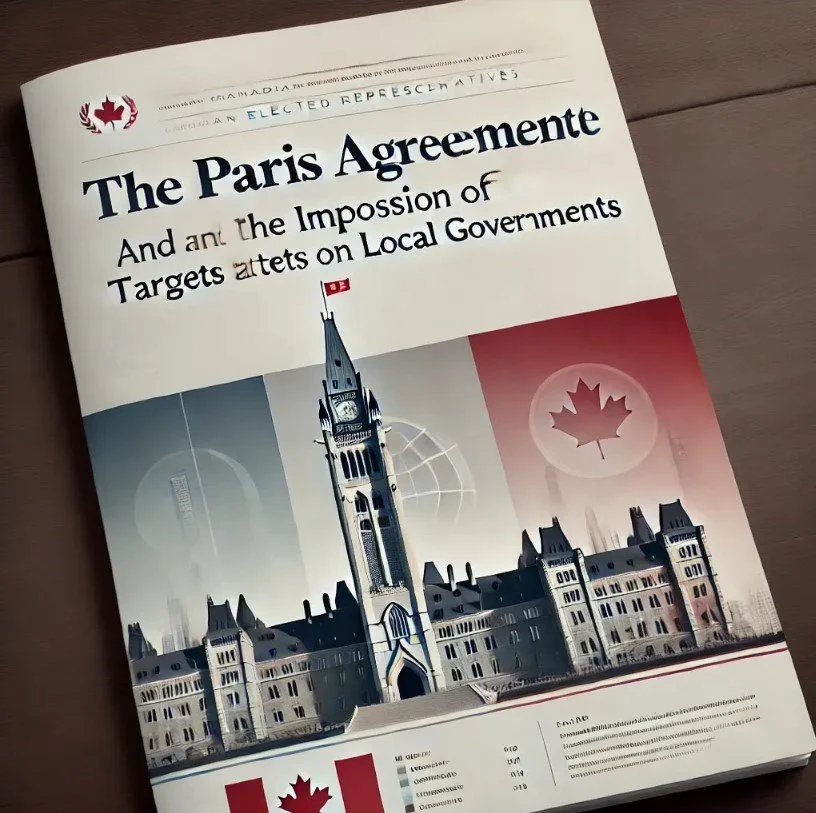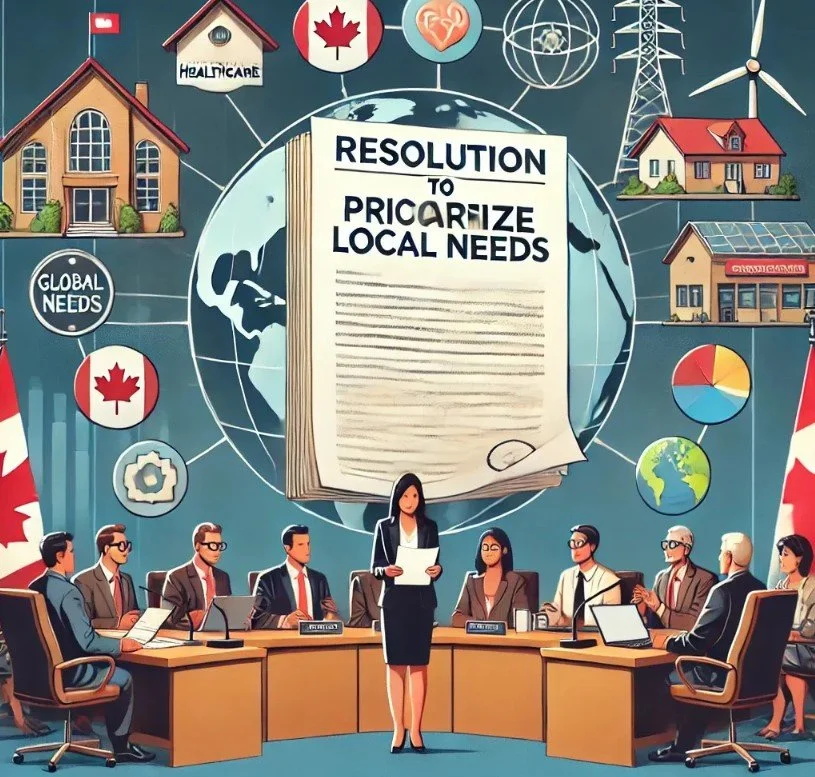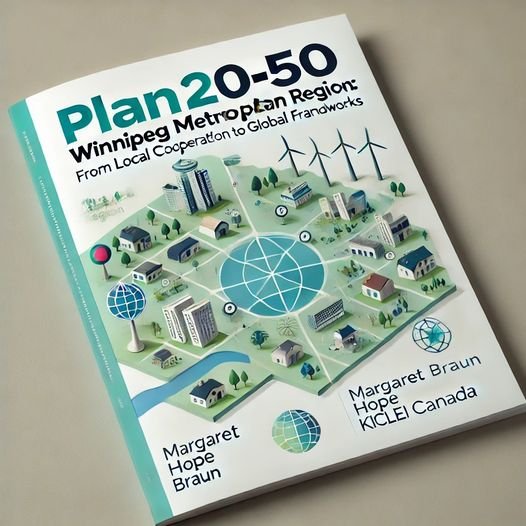
Climate Action or Global Marketing Scheme?
The Partners for Climate Protection Program
Councils Withdraw in Three Easy Steps
Municipal councils participating in the FCM ICLEI Partners for Climate Protection (PCP) program have the option to withdraw at any time, allowing them to re-evaluate their environmental strategies and focus on local priorities. Withdrawing is a straightforward process that keeps community needs at the forefront.
Unsure if Your Municipality is Enrolled?
More than 500 councils participate in the PCP program. Check if your municipality is one of them here: PCP Membership Page.
𝗖𝗼𝘂𝗻𝗰𝗶𝗹𝘀: Withdraw in 3 Easy Steps
Download and Print the Withdrawal Resolution
Adopt the Resolution Within Your Council
Notify the FCM of Your Withdrawal
Understanding the FCM ICLEI Partners for Climate Protection Program: Key Concerns and a Path Forward for Local Governance
This 36-page booklet provides an in-depth examination of key concerns surrounding the Federation of Canadian Municipalities' ICLEI Partners for Climate Protection (PCP) Program. It begins by outlining the program’s origins, goals, and milestones, and then critically explores its impact on Canadian municipalities, including challenges related to local autonomy, financial strain, housing, and privacy risks. Detailed sections analyze Canada's unique environmental context, CO₂'s role, program cost and potential financial liabilities for participating municipalities. A step-by-step guide for withdrawal and a downloadable resolution are included for councils considering an exit from the program.
Download the full booklet to learn about our concerns with the PCP program and steps for municipal withdrawal.

Provincial Pages and PCP Reports
Ontario Municipalities: Re-evaluation of Climate Action Plans and FCM-ICLEI Partners for Climate Protection (PCP) Program Participation
-
Ontario Municipalities: Re-evaluation of Climate Action Plans and ICLEI Partners for Climate Protection Program Participation
Date: January. 22, 2025
To: Ontario Municipal Council’s
Subject: Concerns Regarding the Climate Action Plan’s and the FCM ICLEI’s Partners for Climate Protection Program FrameworkExecutive Summary
This report advises Ontario`s municipalities to critically reevaluate participation in the FCM ICLEI Partners for Climate Protection (PCP) Program and the implementation of Climate Action Plans. While marketed as progressive climate initiatives, these programs often impose significant financial and administrative burdens on municipalities, without yielding proportional benefits.
Ontario is a net carbon sink due to its vast forests, wetlands, peatlands, and agricultural lands, which naturally absorb more CO₂ than the province emits. This fact challenges the necessity and cost-effectiveness of adopting net-zero frameworks.
Further, Ontario`s municipalities face full financial and legal liability for any failures in implementing PCP programs, while ICLEI and its funding partners explicitly disclaim responsibility.
Redirecting municipal resources from externally driven climate programs to locally prioritized issues such as ensuring community growth through housing and energy availability, adaptive infrastructure, economic development and public safety will better serve residents.
Key Recommendations:
Pause and Reevaluate PCP participation and Climate Action Plans.
Ensure Transparency through financial audits and public consultation.
Withdraw from the PCP Program and redirect funds to local initiatives.
Prioritize Practical Environmental Stewardship over costly net-zero targets.
Address Immediate Municipal Needs such as housing, energy, and public safety.
-
The Ontario Municipal Act and Council Authority
Under Section 224 of the Ontario Municipal Act, 2001[1], councillors, as elected officials, are responsible for:
“Representing the public and considering the well-being and interests of the municipality.”
“Developing and evaluating the policies and programs of the municipality.”
“Ensuring accountability and transparency of the operations of the municipality.”
These legal duties confirm that decision-making authority rests solely with council, not staff or consultants.
Councillors’ Declaration of Office further reinforces this authority, requiring them to:
“Truly, faithfully and impartially exercise this office to the best of my knowledge and ability.” [1]
This sworn commitment obligates councillors to uphold the law, act in the best interests of residents, and make independent, informed decisions.
While staff and consultants may advise, their role is not to decide. The council alone holds the final authority to approve, modify, or reject programs like the ICLEI Partners for Climate Protection (PCP) and associated Climate Action Plans.
Given this mandate, council must carefully evaluate whether such programs align with local priorities or impose unnecessary costs and external controls.
-
Legal Context: International, Federal, and Provincial Requirements
Municipalities must navigate various climate policies within international, federal, and provincial frameworks. While agreements like the Paris Agreement set national targets, they do not legally bind municipalities. Federal and provincial policies provide guidance but allow local governments to set their own priorities.
The Paris Agreement
The Paris Agreement [2] is an international treaty that commits countries, not municipalities, to Nationally Determined Contributions (NDCs) for greenhouse gas reductions.
Participation in programs like ICLEI’s PCP is voluntary, and Ontario municipalities are under no legal obligation to implement net-zero policies aligned with the agreement.
Federal Legislation—The Canadian Net-Zero Emissions Accountability Act
The Canadian Net-Zero Emissions Accountability Act [3] commits Canada to achieving net-zero GHG emissions by 2050 but imposes no mandatory requirements on municipalities.
Municipalities remain free to determine their own priorities and approaches without legal enforcement under this federal act.
Ontario’s Climate Policy History
Ontario repealed its Climate Change Mitigation and Low-Carbon Economy Act, 2016[8], which established a cap-and-trade system aimed at reducing greenhouse gas emissions.
Since then, Ontario has not enacted any binding legislation mandating municipalities to adopt net-zero targets or milestone-based frameworks like those promoted by ICLEI.
Local governments maintain full autonomy to design policies that align with local needs, finances, and priorities.
Ontario municipalities are not legally required to adopt net-zero policies or participate in programs like ICLEI’s PCP. They have the flexibility to pursue initiatives that align with their community’s needs and resources.
-
Liability Waivers and What They Mean for Municipalities
Although ICLEI, the Federation of Canadian Municipalities (FCM), and the Government of Canada fund and administer programs such as PCP, these organizations have explicitly disclaimed liability for the outcomes or impacts of municipal participation [5].
Key Disclaimer (PCP Webpage):
“This project was carried out with assistance from the Green Municipal Fund[6], a Fund financed by the Government of Canada and administered by the Federation of Canadian Municipalities, and from ICLEI – Local Governments for Sustainability (Management) Inc. Notwithstanding this support, the views expressed are the personal views of the authors, and ICLEI Canada, the Federation of Canadian Municipalities, and the Government of Canada accept no responsibility for them.”
What Does This Mean for Ontario Municipalities?
Voluntary Adoption: Programs modeled after PCP milestones are voluntary, and municipalities can opt out without facing legal penalties.
No External Accountability: ICLEI, FCM, and the Government of Canada have waived responsibility for any financial losses, policy failures, or legal disputes arising from participation.
Local Risk: Municipalities bear full legal and financial accountability for any cost overruns, compliance challenges, or policy impacts associated with their climate plans.
Financial Uncertainty: While programs may include grant funding, municipalities must cover long-term costs for implementation, monitoring, and reporting—often millions of dollars—without guarantees of success or protection from liability.
-
Comparison of PCP Reporting vs. Ontario Energy Report
There is a significant difference between the Ontario Energy Consumption and Demand Report and comprehensive Climate Action Plan frameworks:
The Ontario Energy Consumption and Demand Report focuses solely on tracking and improving energy efficiency within municipal operations, requiring minimal administrative effort and limited costs.
In contrast, the Climate Action Plan frameworks demand broad data collection across both community and corporate sectors, extensive reporting, and costly implementation of emissions reduction initiatives that extend far beyond municipal operations and responsibilities.
The PCP program’s reporting requirements under Milestone 5 are significantly more demanding than those of existing provincial frameworks like the Ontario Energy Report. We have sent an open letter to ICLEI to confirm that they receive the data and to understand their relationship with recommended product suppliers. ICLEI has not responded [10].
-
Data Collection Concerns
The Climate Action Plan requires extensive data collection at both the corporate (municipal operations) and community levels. These data collection requirements, outlined in the PCP Milestone One Protocol Handbook [8], are repeated annually or biannually and include:
Corporate Data Collection Requirements:
Tracking energy consumption from all sources, including non-CO₂-emitting sources.
Recording electricity usage for all municipal lighting annually.
Monitoring energy consumption for water and wastewater facilities.
Reporting fuel sources and emissions from all municipal buildings and facilities.
Conducting waste audits to categorize and measure all waste materials, from food waste to electronics.
Calculating the methane potential of landfill waste and assessing decay rates annually.
Collecting data on fuel usage for all municipal fleet vehicles, including public transit and staff commuting patterns.
Community-Wide Data Collection Requirements:
Emissions from residential, commercial, and industrial buildings, including fuel and electricity consumption.
Fuel sales data and kilometers traveled by all vehicle types, public transit, and private transportation within the county.
Monitoring emissions from industrial processes and wastewater treatment.
Detailed solid waste data, including livestock counts and methane potential.
These requirements represent a significant administrative burden and raise serious ethical and privacy concerns, such as:
Infringement on privacy: Residents and businesses may not be aware that their energy and waste habits are being tracked, leading to potential distrust in local government.
Data security risks: Sensitive information is often managed by third-party organizations such as ICLEI, raising concerns about data breaches and potential misuse.
Profit-driven motives: Data collected is often used to market "green energy" products, benefiting corporate interests rather than prioritizing genuine environmental stewardship.
This level of surveillance and data harvesting could be seen as disproportionate where local environmental initiatives can be achieved without such invasive measures.
-
PCP Cost Projections
Participation in the PCP program is often marketed as a low-cost initiative; however, significant hidden costs exist [7]. These financial demands disproportionately burden rural and smaller municipalities with recurring expenses tied to externally driven objectives.
Estimated Costs for PCP Participation and Implementation
Milestone/Initiative
Estimated Cost Range*
Baseline Emissions Inventory
$10,000–$50,000
Emissions Reduction Targets
$5,000–$25,000
Local Action Plan Development
$20,000–100,000
Implement Action Plan
$50,000–1,000,000+
Monitor and Report Results
$10,000–50,000 annually
Municipal Fleet Upgrades
$500,000–5,000,000+
EV Charging Stations
$100,000–1,000,000+
Municipal Building Upgrades
Smart City Technology
$1,000,000–10,000,000+
$500,000–5,000,000+
Circular Economy Initiatives
$1,000,000–10,000,000+
15-Minute City Model
$5,000,000–50,000,000+
Active Transportation Networks
$1,000,000–20,000,000+
Urban Densification
$5,000,000–100,000,000+
Total Cost Range:
Modest Implementation: $8.2 million
Comprehensive Implementation: $212 million+
These conservative estimates underscore the financial burden imposed by PCP participation and Climate Action Plan implementation. A thorough cost analysis of the program expenditures to date and anticipated future costs is essential.
-
Ontario’s CO₂ Emissions and Carbon Sequestration Capacity
Ontario’s CO₂ Emissions and Carbon Sequestration Capacity
Provincial Emissions Ontario has a population of approximately 14.5 million residents. Using Canada’s average per capita emissions of 14.2 tonnes of CO₂ per year, Ontario’s gross emissions are calculated as follows:
14.5 million residents × 14.2 tonnes of CO₂ per resident per year = 205.9 million tonnes of CO₂ annually.
Thus, Ontario’s gross annual CO₂ emissions are approximately 205.9 million tonnes.
Ontario’s Carbon Sequestration Capacity Net-zero programs often overlook preexisting carbon sinks, failing to account for natural ecosystems that already absorb large amounts of carbon dioxide. These programs treat all areas equally, ignoring the significant contributions of forests, wetlands, peatlands, managed forests, and agricultural lands to carbon sequestration.
Ontario’s ecosystems serve as powerful carbon sinks, absorbing significantly more CO₂ than the population emits. Hectares by category and their estimated absorption rates are as follows:
Forests – Cover approximately 43.2 million hectares (excluding managed forests), absorbing an estimated 7.7 tonnes of CO₂ per hectare annually, for a total of 332.6 million tonnes of CO₂ absorbed annually[4].
Managed Forests – Cover approximately 27.8 million hectares, absorbing an estimated 11 tonnes of CO₂ per hectare annually, for a total of 305.8 million tonnes of CO₂ absorbed annually[4].
Wetlands – Cover approximately 96,014 hectares, absorbing an estimated 1.85 tonnes of CO₂ per hectare annually, for a total of 177,626 tonnes of CO₂ absorbed annually[11].
Farmlands (Agricultural Soils) – Cover approximately 36 million hectares, absorbing an estimated 3.1 tonnes of CO₂ per hectare annually, for a total of 111.6 million tonnes of CO₂ absorbed annually[10].
Peatlands – The Hudson Bay Lowlands alone cover approximately 26 million hectares, absorbing an estimated 5.5 tonnes of CO₂ per hectare annually, for a total of 143 million tonnes of CO₂ absorbed annually[4].
Net CO₂ Balance:
205.9 million tonnes (emissions) − 893.2 million tonnes (sequestered) = -687.3 million tonnes annually
Ontario is a significant net carbon sink, absorbing approximately 687.3 million tonnes more CO₂ than it emits annually.
Ecosystems Not Yet Included in the Calculation:
Grasslands: Limited data but contribute modestly to sequestration [9].
Urban Green Spaces: Parks, green roofs, and urban forests remain unquantified [9].
Riparian Zones: Vegetated areas along rivers and lakes need further study.
Aquatic Vegetation: Underwater ecosystems, like lake and river plants, are not yet included.
Including these ecosystems would increase Ontario’s total CO₂ sequestration capacity further.
Ontario is a net carbon sink, absorbing approximately -687.3 million tonnes more CO₂ than it emits each year. This substantial carbon sequestration capacity highlights the misalignment between costly net-zero policies and Ontario's existing environmental strengths.
-
Redirecting Resources to Local Priorities
In Canada, municipalities operate under the authority of provincial and territorial governments, which delegate specific responsibilities through legislation such as Municipal. While responsibilities may vary slightly by province or territory, the core municipal responsibilities generally include:
• Housing Availability: Addressing rising costs and availability challenges to ensure safe, accessible housing for all residents, while protecting property rights and preventing the over-classification of rural land that displaces people and limits rural development opportunities.
• Energy Security: Ensuring affordable, reliable energy to support households, businesses, and community infrastructure, including the expansion of natural gas to meet growing demand and support economic development.
• Land Use Planning and Development: Ensuring balanced growth and zoning policies that support both urban and rural communities, resisting centralized "sustainable development" policies that disproportionately favor urban areas at the expense of small and rural communities.
• Infrastructure Maintenance and Expansion: Ensuring the upkeep and improvement of roads, bridges, water, and wastewater systems.
• Public Transit: Providing accessible, efficient, and affordable transportation options for residents, while avoiding transportation models that discourage private gas-powered vehicle use or limit parking near small businesses in favor of active transportation.
• Emergency Services and Public Safety: Supporting police, fire, and paramedic services to enhance community safety and response capabilities, including mental health supports and emergency preparedness.
• Waste Management: Overseeing efficient collection, recycling, and disposal services to promote environmental stewardship.
• Parks and Recreation: Maintaining and expanding green spaces, recreational facilities, and community programs to enhance quality of life.
• Economic Development: Promoting job creation and local industry growth to sustain vibrant and resilient communities, with a focus on organic local growth, small businesses, and entrepreneurship. It is not acceptable to prioritize global investors and big-box stores over locally owned businesses that are the backbone of the community.
• Public Health and Social Services: Collaborating with health agencies to address community well-being and social support programs.
• Government Accountability: Strengthening transparency and fiscal responsibility to restore public trust and confidence in decision-making.
Municipal governments must focus on core responsibilities that directly impact residents and avoid diverting funds toward global initiatives that fall outside their jurisdiction, such as internationally driven climate action programs.
Redirecting funds and efforts toward these critical community needs better serves residents and ensures that municipal governments remain focused on local priorities. This approach avoids imposing costly net-zero policies that are misaligned with Ontario's existing natural carbon advantage and the immediate concerns of its citizens.
-
Recommendations
1. Pause and Reevaluate the PCP Program and Climate Action:
Conduct a comprehensive review of the program and climate action plan, including public consultation, to ensure it aligns with local priorities and financial capacities.
Assess the cost-effectiveness and feasibility of continuing with the data-driven milestone-based framework.
2. Improve Transparency and Accountability:
Disclose all costs already incurred under the PCP program and Climate Action Plan, including consultation fees, data collection expenses, and projected liabilities.
Conduct a financial audit of climate-related spending to assess the long-term impact on taxpayers and municipal resources.
Engage residents and stakeholders in public consultations to restore trust and ensure accountability for policy decisions.
3. Withdraw from the PCP Program and Halt Climate Action Plan Implementation:
Immediately withdraw from the ICLEI Partners for Climate Protection (PCP) program or similar 5 Milestone frameworks to end participation in externally driven climate action plans that do not reflect Ontario’s net-negative carbon status or local priorities.
Cease development and implementation of the Climate Action Plan to prevent further financial commitments, administrative burdens, and policy constraints tied to net-zero targets.
Redirect resources toward practical, locally driven initiatives that deliver measurable benefits to residents and the municipality.
4. Prioritize Local Environmental Stewardship and Practical Solutions:
Focus on protecting natural carbon sinks—forests, wetlands, peatlands and agricultural lands—that already absorb more CO₂ than the province emits, maintaining Ontario’s net-negative carbon status.
Develop cost-effective programs to improve pollution prevention, water quality, and waste management, ensuring local control and economic sustainability.
Develop practical, locally driven programs that enhance carbon sequestration without imposing excessive costs or reliance on data collection and “green” technologies.
Support infrastructure resilience and emergency preparedness to protect against natural disasters and improve community safety.
5. Address Immediate Municipal Priorities:
Housing: Limit restrictions on land-use and green tape on construction to increase access to safe, affordable housing and meet urgent local needs.
Energy Security: Invest in affordable, reliable energy infrastructure to protect residents and businesses.
Economic Development: Promote local job creation and industry growth to support sustainable economic activity.
Public Safety and Community Programs: Strengthen fire services, policing, and emergency response capabilities to safeguard lives and property.
Government Accountability: Maintain transparency and fiscal responsibility to ensure trust and confidence in decision-making.
-
Conclusion
Ontario’s net-negative carbon balance proves that net-zero frameworks and climate action plans are misaligned with the province’s environmental strengths, immediate local priorities and municipal responsibilities. We respectfully request the councils to reevaluate climate policies, prioritize transparency, and safeguard the interests of its residents.
Sincerely,
Maggie Braun, KICLEI Canada, info@kiclei.ca
Concerned Residents and Stakeholders of Ontario Municipalities -
References
Ontario Municipal Act, 2001, S.O. 2001, c. 25. Retrieved from https://www.ontario.ca/laws/statute/01m25
The Paris Agreement (2015). United Nations Framework Convention on Climate Change. Retrieved from https://unfccc.int/process-and-meetings/the-paris-agreement/the-paris-agreement
Canadian Net-Zero Emissions Accountability Act, S.C. 2021, c. 22. Retrieved from https://laws-lois.justice.gc.ca/eng/acts/C-19.5/
Ontario Ministry of Natural Resources and Forestry. Forest Resources of Ontario. Retrieved from https://www.ontario.ca/document/forest-resources-ontario-2021
Partners for Climate Protection (PCP) Program. Retrieved from https://www.pcp-ppc.ca/membership
Federation of Canadian Municipalities (FCM). Green Municipal Fund. Retrieved from https://fcm.ca/en/programs/green-municipal-fund
KICLEI Report. 2024. Cost Breakdown for Municipalities Participating in the PCP Program and Climate Action Plans. Retrieved from https://kiclei.substack.com/p/cost-breakdown-for-municipalities
PCP Milestone One Protocol Handbook. 2025. Retrieved from https://assets-global.website-files.com/6022ab403a6b2126c03ebf95/620d73c877f300b64e148909_pcp-milestone-1-instruction-manual.pdf
KICLEI. 2024. Open Letter to ICLEI Canada: Request for Information on ICLEI's Origin, Program Implementation, and Funding Sources. Retrieved from https://kiclei.substack.com/p/open-letter-to-iclei-canada-request
Greenbelt Foundation. Biodiversity in Ontario’s Greenbelt. Retrieved from https://www.greenbelt.ca/biodiversity_in_ontario
Ontario Ministry of Environment, Conservation, and Parks. Ontario's Climate Change Policy. Retrieved from https://www.ontario.ca/page/climate-change
Springer Link. Wetlands and Carbon Sequestration Rates. Retrieved from https://link.springer.com/article/10.1007/s11769-020-1122-3
-
Subject: Request for Municipal Re-evaluation of Climate Action Plans and FCM-ICLEI Partners for Climate Protection Program Participation
Dear [Mayor and Council Members],
I am writing to you as a concerned resident of [Municipality] to formally request that Council pause and critically reevaluate our municipality’s participation in the FCM-ICLEI Partners for Climate Protection (PCP) Program and the implementation of associated Climate Action Plans.
A recently released report titled "Ontario Municipalities: Re-evaluation of Climate Action Plans and FCM ICLEI Partners for Climate Protection Program Participation" raises several significant concerns regarding the financial, administrative, and legal implications of these programs. It highlights how these initiatives often impose considerable costs on municipalities without delivering proportional local benefits.
It is important to note that participation in the PCP program and the adoption of net-zero policies are not legally mandated at the municipal level by either the federal or provincial government. Municipalities have full autonomy to decide whether these initiatives align with local priorities, financial capacities, and community needs.
Key Concerns Raised in the Report:
Ontario is Already a Net Carbon Sink:
Ontario’s forests, wetlands, and agricultural lands naturally absorb more CO₂ than the province emits. This raises questions about the necessity of costly net-zero policies when local environmental stewardship efforts could be prioritized instead.
Significant Financial and Legal Liabilities:
The report outlines that while municipalities bear full financial and legal responsibility for implementation failures, ICLEI and its funding partners, including the Federation of Canadian Municipalities (FCM), disclaim all liability.
Cost estimates for full PCP implementation can range from $8.2 million to over $200 million, which could be better directed toward local priorities such as housing, infrastructure, and public safety.
Transparency and Accountability Issues:
Many municipalities have entered into these programs without comprehensive financial audits or extensive public consultation.
The report recommends ensuring transparency by conducting audits and disclosing all climate-related expenditures to residents.
Data Collection and Privacy Concerns:
Participation in the PCP program requires extensive data collection at both municipal and community levels, raising potential privacy and security risks for residents and local businesses.
This data is often shared with third-party organizations such as ICLEI, with limited municipal oversight.
Focus on Practical Local Solutions Instead:
The report suggests redirecting funds toward pressing municipal issues such as:
Housing availability and affordability
Energy security and economic development
Infrastructure improvements and public safety
Pollution prevention and environmental stewardship
Recommendations for Council Consideration:
Pause and Reevaluate Participation: Conduct a full review of our Climate Action Plan and PCP membership to ensure alignment with local priorities and financial capacities.
Improve Transparency: Disclose all program-related expenditures and engage in public consultations to gather resident input.
Withdraw from the PCP Program: End participation in externally driven climate programs that do not directly benefit our community.
Prioritize Local Needs: Redirect resources toward housing, energy, public safety, and economic development initiatives that provide tangible benefits to our residents.
As stewards of our municipality, it is essential that Council exercises its authority under the Ontario Municipal Act, 2001, which requires elected officials to represent the public interest, ensure transparency, and make informed, independent decisions.
The full report is available for your review here:
Ontario Municipalities: Re-evaluation of Climate Action Plans and FCM-ICLEI Partners for Climate Protection Program ParticipationI urge you to carefully review the findings and recommendations outlined in the report and consider taking immediate action to realign municipal efforts with the real needs of our community.
Thank you for your time and dedication to our municipality’s well-being. I look forward to your response and hope for a transparent discussion on this matter.
Sincerely,
[Your Full Name]
[Your Address]
[Your Email]
[Your Phone Number] -
5-Minute Deputation Script to [Municipality Name] Council
Introduction (1 Minute)
Good [morning/afternoon/evening], Mayor [Last Name], Councillors, and staff.
My name is [Your Name], and I am here today as a concerned resident of [Municipality Name] to respectfully request that Council pause and reevaluate our participation in the ICLEI Partners for Climate Protection (PCP) Program and the associated Climate Action Plan.
Along with other residents, I have submitted a detailed report titled "Ontario Municipalities: Re-evaluation of Climate Action Plans and ICLEI Partners for Climate Protection Program Participation," which outlines significant concerns regarding the financial, legal, and administrative burdens of these initiatives.
Additionally, a petition signed by [X number] residents has been submitted, demonstrating strong public opposition to these voluntary global net-zero policies. A recent community survey further confirms that the majority of residents want Council to focus on core municipal responsibilities—such as housing, infrastructure, and public safety—rather than externally driven climate programs.
Key Issue (1 Minute)
Participation in the PCP program is not legally mandated by the federal or provincial governments. Our municipality has the full authority to determine whether these programs align with local priorities, and many residents believe they do not.
The report highlights that Ontario is already a net carbon sink, with our forests, wetlands, and agricultural lands absorbing more CO₂ than the province emits. This challenges the necessity of costly net-zero frameworks that do not reflect our environmental reality.
Financial and Legal Concerns (1 Minute)
The report and petition emphasize that PCP participation imposes significant financial burdens, with costs estimated between $8.2 million and over $200 million for implementation, monitoring, and compliance. These funds could be better directed toward pressing local needs.
Moreover, ICLEI and funding partners such as the Federation of Canadian Municipalities (FCM) explicitly waive financial and legal liability, leaving our municipality solely responsible for any failures or unforeseen expenses. This is an unacceptable risk to taxpayers.
Transparency and Privacy Risks (1 Minute)
Our community survey results reveal that residents feel uninformed about the extent of data collection under the Climate Action Plan. The PCP program requires tracking of energy use, waste audits, and even private transportation habits, raising serious privacy concerns regarding how this data is stored, used, and shared with third-party organizations such as ICLEI.
Residents deserve full transparency and the opportunity to provide meaningful input before Council makes further commitments.
Call to Action (1 Minute)
Based on the findings of the report, the petition, and survey feedback, I respectfully urge Council to:
Pause and Reevaluate Participation: Conduct a full review of the Climate Action Plan and its financial implications.
Improve Transparency: Hold public consultations and disclose all climate-related spending to date.
Redirect Resources: Focus on core municipal responsibilities such as affordable housing, energy security, and public safety.
Thank you for your time and commitment to our community. I look forward to your response and am happy to answer any questions you may have.
-
Statement of Support & Petition to Pause and Reevaluate Municipal Participation in the FCM- ICLEI Partners for Climate Protection (PCP) Program
To: [Municipality Name] Mayor and Council
From: Concerned Residents of [Municipality Name]We, the undersigned residents of [Municipality Name], respectfully request that Council pause and thoroughly reevaluate our municipality’s participation in the ICLEI Partners for Climate Protection (PCP) Program and the implementation of the Climate Action Plan.
Participation in this program is not legally mandated by federal or provincial governments, and we believe municipal resources should focus on core priorities that directly benefit our community, such as housing, infrastructure, energy security, and public safety.
Our Concerns:
Financial Burden: Implementation and compliance costs for the PCP program could reach millions of taxpayer dollars, which could be better allocated to pressing local needs.
Lack of Transparency: Many residents were unaware of the municipality’s commitment to this program, and decisions were made without adequate public consultation or financial disclosure.
Privacy Concerns: The PCP program requires extensive data collection on energy use, transportation, and waste, raising concerns about data security and potential misuse by third parties.
Local Autonomy: Our municipality should have the freedom to develop practical, locally driven environmental stewardship initiatives that respect our economic realities and existing environmental strengths.
Ontario is Already a Net Carbon Sink: Our forests, wetlands, and agricultural lands absorb more CO₂ than we emit, making costly net-zero policies unnecessary and misaligned with our environmental reality.
We urge Council to:
Pause and review the program's financial, legal, and administrative impacts.
Hold public consultations to allow residents to voice their concerns.
Redirect resources to address urgent community needs, such as housing affordability, road maintenance, and emergency services.
By signing this petition, we affirm our support for a thorough reassessment of our municipality’s climate policies to ensure they align with local priorities and financial realities.
Name (Printed) | Signature | Address | Email (Optional)
Thank you for your attention to this matter.
Reports on UN Directives and Programs
Recent Reports and Studies
Regional Reports and Studies








